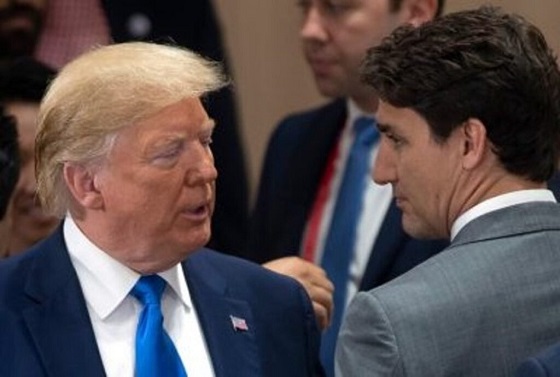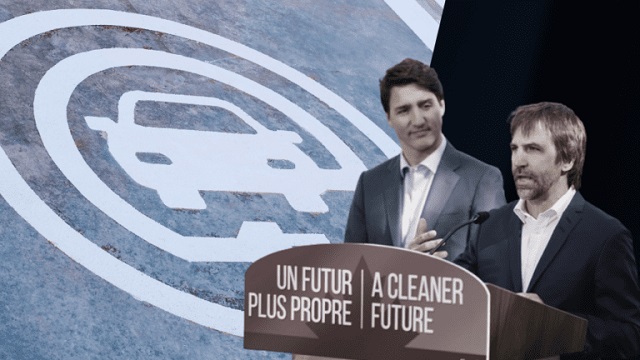Business
A tale of two countries – Drill, Baby, Drill vs Cap, Baby, Cap

From EnergyNow.ca
By Deidra Garyk
Analysis of the U.S. Election and the Canadian Oil and Gas Emissions Cap
Monday, November 4, the Canadian federal government announced the long-awaited draft emissions cap for the oil and gas industry.
The next day, the world’s largest economy held an election that resulted in a decisive victory for the position of 47th President of the USA.
With the GOP (Republicans) taking a commanding lead with 53 out of 100 possible Senate seats, and two more still to be confirmed, they have a majority that can help move along their plans for at least the next two years. Rumoured expectations are that they’ll take the House too, which will further solidify President-elect Trump’s mandate.
As part of Trump’s campaign platform, Agenda47, he promised “to bring Americans the lowest-cost energy and electricity on Earth.” The agenda pledged that “to keep pace with the world economy that depends on fossil fuels for more than 80% of its energy, President Trump will DRILL, BABY, DRILL.”
The platform also states that under his leadership, the US will once again leave the Paris Climate Accords, and he will oppose all Green New Deal policies that impact energy development. He also plans to roll back the Biden administration’s EV mandates and emissions targets, while advocating for low emissions nuclear energy.
It isn’t a guarantee that he will do anything that he says; however, if the past is any indication, we can expect Trump to follow through on his energy and climate promises.
Even though Canada and the USA are on a contiguous land mass, they could not be farther apart in energy and climate ideology.
On the northern side of the border, a day before, Canada’s green avengers of the Liberal cabinet congregated for a press conference to jubilantly announce their emissions cap, which has been studied and determined to be a defacto production cap. CAP, BABY, CAP!
Claims that the new rules go after pollution, not production, should be met with scepticism. If pollution is the problem, there would be blanket emissions caps on all heavy emitting industries and imported oil and gas would be subject to the same requirements, but it is not. I’m not sure how else to read it other than a willful slight with a sledgehammer against the Canadian oil and gas industry.
Especially since Natural Resources Minister Jonathan Wilkinson said that this is a backstop to ensure the Pathways Alliance does what they say they will. I wonder if the Pathways folks feel like they have a giant target on their backs… and fronts?
The hour-long press conference was a lesson in how to deceive with a straight face. Most of the Liberals’ claims have either been discredited or are unsubstantiated as to be meaningless.
Wilkinson, a Rhodes Scholar, calls this cap an “economic opportunity” because he believes that for Canadian oil and gas, climate change is a competitive issue, for both combusted and non-combusted products. Square that circle when no other country on the planet has an emissions cap on its oil and gas industry.
Nonetheless, the Liberals expect production to increase, which is counter to what they say out of the other side of their mouths – that oil and gas demand will peak this year, and we are not going to be using it much longer so we should just shut it all down.
Wilkinson excitedly announced the need for thousands and thousands of workers to build the decarbonization infrastructure of the new energy future. However, the Department of Environment’s Cost-Benefit Analysis Summary contradicts this claim, citing thousands of job losses.
The Study also identifies that the costs from the plan will be borne by Canadians. The Conference Board of Canada expressed similar concerns, but they were dismissed by the politicians on stage.
Edmonton MP and Minister of Employment, Workforce Development, and Official Languages Randy Boissonnault, also known as “The Other Randy” for his ethical mis-steps, put on one of the best shows of the press conference. He speaks so convincingly that you almost believe him. Almost.
He claimed that when he was campaigning last election during the Covid pandemic, the number one topic at the doors was climate change. Edmontonians wanted to talk about climate change over the global pandemic that was disrupting their lives? Yeah, right.
The Other Randy praised Ministers Guilbeault and Wilkinson for working with industry on the regulations and promised that Canadian workers will be part of the consultation and final rules. Forgive me for being sceptical.
The Spiderman-like Steven Guilbeault, Minister of Environment and Climate Change, said that oil companies have seen record profits, going from $6.6 billion pre-pandemic to $66 billion post-pandemic, and the Liberals want that extra money used on projects they approve of, namely ones that are climate-related.
Guilbault believes this cap is necessary for prosperity and energy security, along with being good for workers and “for good union jobs”. It’s not often talked about, but within the feds’ climate plans is a push for unionizing jobs. It was top-of-mind for the Deputy Minister of Labour when I was part of a delegation to Ottawa last year. She was most interested in learning about how many oil and gas jobs are unionized and showed visible displeasure at finding out that most are not.
The press conference seemed to be more of a one-sided political bun fight, with a disproportionate amount of time spent talking smack about Pierre Poilievre, Premier Danielle Smith, and Premier Scott Moe. Perhaps demonstrating the Liberals’ trepidation about the future since the final regulations will come out late next year and go into effect January 1, 2026, when it’s likely they will be out of office.
With the climate zealots out of power, enforcement may be a challenge. What if companies don’t meet the arbitrary targets and deadlines imposed by the rules? What if companies don’t buy the required credits? A reporter asked, but Guilbeault didn’t give an answer in his response. I guess we will have to wait to see what changes are made to the Canadian Environmental Protection Act (CEPA), the enforcement regulations.
Wilkinson said climate change is a “collective action problem” that must be addressed as it is the “existential threat to the human race.” This gives you a sense of how they see things – there is a problem and government is the solution.
Meanwhile, energy policy is a “Day 1 priority” for Trump. As a businessperson, he understands that demand is growing, and limited regulations are the way to develop all forms of energy.
Even if industry can meet the emissions reduction targets – there are a variety of opinions on the proposed rules – it does not mean the regulations should be implemented. Canada’s real per capita GDP is 73 per cent of America’s, so as Canada goes hard on emissions reduction regulations, if investment moves south, that number is not going to improve. Don’t let them tell you otherwise.
Deidra Garyk is the Founder and President of Equipois:ability Advisory, a consulting firm specializing in sustainability solutions. Over 20 years in the Canadian energy sector, Deidra held key roles, where she focused on a broad range of initiatives, from sustainability reporting to fostering collaboration among industry stakeholders through her work in joint venture contracts.
Outside of her professional commitments, Deidra is an energy advocate and a recognized thought leader. She is passionate about promoting balanced, fact-based discussions on energy policy and sustainability. Through her research, writing, and public speaking, Deidra seeks to advance a more informed and pragmatic dialogue on the future of energy.
Business
Senator wants to torpedo Canada’s oil and gas industry

From the Fraser Institute
Recently, without much fanfare, Senator Rosa Galvez re-pitched a piece of legislation that died on the vine when former prime minister Justin Trudeau prorogued Parliament in January. Her “Climate-Aligned Finance Act” (CAFA), which would basically bring a form of BDS (Boycott, Divestment, and Sanctions) to Canada’s oil and gas sector, would much better be left in its current legislative oblivion.
CAFA would essentially treat Canada’s oil and gas sector like an enemy of the state—a state, in Senator Galvez’ view, where all values are subordinate to greenhouse gas emission control. Think I’m kidding? Per CAFA, alignment with national climate commitments means that everyone engaged in federal investment in “emission intensive activities [read, the entire oil and gas sector] must give precedence to that duty over all other duties and obligations of office, and, for that purpose, ensuring the entity is in alignment with climate commitments is deemed to be a superseding matter of public interest.”
In plain English, CAFA would require anyone involved in federal financing (or federally-regulated financing) of the oil and gas sector to divest their Canadian federal investments in the oil and gas sector. And the government would sanction those who argue against it.
There’s another disturbing component to CAFA—in short, it stacks investment decision-making boards. CAFA requires at least one board member of every federally-regulated financial institution to have “climate expertise.” How is “climate expertise” defined? CAFA says it includes people with experience in climate science, social science, Indgineuous “ways of knowing,” and people who have “acute lived experience related to the physical or economic damages of climate change.” (Stacking advisory boards like this, by the way, is a great way to build public distrust in governmental advisory boards, which, in our post-COVID world, is probably not all that high. Might want to rethink this, senator.)
Clearly, Senator Galvez’ CAFA is draconian public policy dressed up in drab finance-speak camouflage. But here’s what it would do. By making federal investment off-limits to oil and gas companies, it would quickly put negative pressure on investment from both national and international investors, effectively starving the sector for capital. After all, if a company’s activities are anathema to its own federal regulators or investment organs, and are statutorily prohibited from even verbally defending such investments, who in their right minds would want to invest?
And that is the BDS of CAFA. In so many words, it calls on the Canadian federal government to boycott, divest from, and sanction Canada’s oil and gas sector—which powers our country, produces a huge share of our exports, and employs people from coast to coast. Senator Galvez would like to see her Climate-Aligned Finance Act (CAFA) resurrected by the Carney government, whose energy policy to-date has been less than crystal clear. But for the sake of Canadians, it should stay dead.
Automotive
Opposition Conservatives fail in attempt to “Pull the Plug” on Carney’s Electric Vehicle Mandate

From Conservative Party Communications
After a Lost Liberal Decade of rising costs and slow growth, Mark Carney wants you to think his government has moved on from Justin Trudeau’s failed policies.
Unfortunately for Canadians, Carney has no interest in scrapping one of his predecessor’s most reckless and costly ideas: a zero-emissions vehicle (ZEV) mandate starting next year that will ultimately ban Canadians from buying gas-powered cars by 2035.
As the required percentage of ZEV sales increases each year, the government wants to force manufacturers and importers to buy costly credits of up to $20,000 for every EV they are short of the Liberals’ quota – a huge expense that will ultimately be passed on to, and paid by Canadian consumers.
That’s why Conservatives have introduced a motion to end this harmful scheme, ensuring Canadians can continue to buy the kind of car they need at a price they can afford.
EVs are great for many families, who should always be free to purchase the vehicle of their choice. But for many Canadians – who live in cold environments or travel long distances – they can be practically useless, especially without the infrastructure to power them.
One government report estimated that changes to Canadian infrastructure required to support a transition to ZEVs could cost up to $300 billion by 2040. On top of the costs already imposed on manufacturers and buyers, this policy will require billions in new tax dollars and government debt.
No wonder one 2024 survey found two thirds of Canadians find the 2035 target is unrealistic.
As unjust tariffs threaten an automotive sector which contributes billions to our GDP, the Liberals continue to put their elitist, top-down ideology ahead of the livelihoods of hundreds of thousands of proud Canadian workers.
While Carney talks about change, Conservatives are here to deliver. That’s why we’re fighting to repeal the ZEV mandate, scrap the industrial carbon tax and cancel Liberal fuel standards. We trust Canadians – not Ottawa’s Liberal elite – to make the best decisions for themselves and their families.
It’s time to put Canadians back in the driver’s seat.
-

 Alberta2 days ago
Alberta2 days agoCentral Alberta MP resigns to give Conservative leader Pierre Poilievre a chance to regain a seat in Parliament
-

 Alberta1 day ago
Alberta1 day agoCalls for a new pipeline to the coast are only getting louder
-

 Daily Caller2 days ago
Daily Caller2 days ago‘Not Held Hostage Anymore’: Economist Explains How America Benefits If Trump Gets Oil And Gas Expansion
-

 Business1 day ago
Business1 day agoCanada’s economic pain could be a blessing in disguise
-

 Alberta2 days ago
Alberta2 days agoAlberta pro-life group says health officials admit many babies are left to die after failed abortions
-

 Censorship Industrial Complex1 day ago
Censorship Industrial Complex1 day agoJordan Peterson reveals DEI ‘expert’ serving as his ‘re-education coach’ for opposing LGBT agenda
-

 Alberta1 day ago
Alberta1 day agoUnified message for Ottawa: Premier Danielle Smith and Premier Scott Moe call for change to federal policies
-

 Economy1 day ago
Economy1 day agoOttawa’s muddy energy policy leaves more questions than answers







